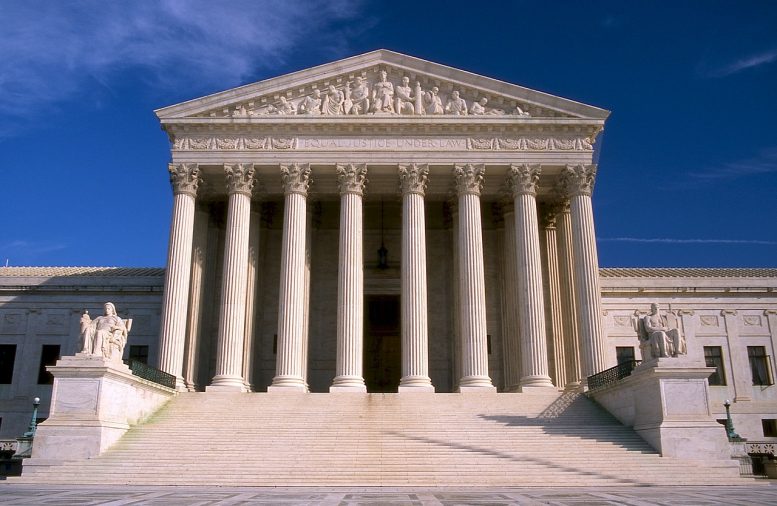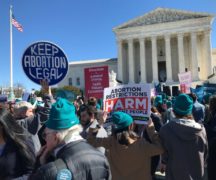By DAVID DUPONT
BG Independent News
Abortion rights and gay marriage are two issues that could hang in the balance with the retirement of Supreme Court Justice Anthony Kennedy.
The 82-year-old justice announced his retirement on Wednesday.
That shouldn’t come as a surprise, said two political scientists who teach at Bowling Green State University.
Melissa Miller said that Supreme Court Justices have lifetime appointments, and they most often decide to retire when a president of the same party that appointed them is in office, she said.
Niki Kalaf-Hughes said some have opined that the timing of Kennedy’s retirement, giving President Donald Trump a second chance to nominate someone for the high court, sullies his reputation. That all depends, she said, on who eventually assumes the bench and how they rule.
Kennedy, appointed by President Ronald Reagan in 1987, is considered the court’s swing vote.
He wrote the majority decision in Obergefeld v. Hodges that found that same sex couples had right to marry. He also wrote the opinion for the conservative majority to Citizens United that said political spending was protected speech under the First Amendment.
If he is replaced by a more conservative justice then some rights that had been assumed to be settled matters, including the right of a woman to terminate a pregnancy and the right of same sex couples to marry, could now be in jeopardy.
Some in the women’s movement have been warning, Miller said, that “we shouldn’t one shouldn’t take Roe v Wade for granted.”
State legislators in conservative states continue to push bills that cut into those rights. “I don’t think that will stop in very conservative states,” she said, “because politicians are rewarded by their conservative voters for passing such laws.”
Trump promised when he campaigned that he would appoint more conservative justices.
And by some measures, his first appointee Neil Gorsuch is more conservative than the justice he replaced, the late Antonin Scalia, though not as conservative as Justices Clarence Thomas and Samuel Alito.
Because of actions by Senate Republicans, who said they were reacting to changes instituted earlier by Democrats for lower court appointments, it now takes only a simple majority to ratify the president’s nominee to the high court, not a 60-vote super majority. And without the filibuster “it makes it easier for a president to get the most ideological extreme person on the bench,” Miller said. That’s true whether the Republicans or the Democrats are in control, she said.
That raises the stakes for this year’s mid-term elections in November.
Kalaf-Hughes thinks there’s a chance the vacancy will not be filled by then. Those considered to fill the vacancy have to go through a gauntlet of ethical checks. All that will move slower during the summer, and then Congress will take time off to campaign.
Miller, however, believes the appointment will a settled matter by November. The Democrats don’t have any procedural tools to slow the process down. “I don’t see a way the Democrats could block this nomination.”
Their only hope they have is that Republicans who have demonstrated some willingness to oppose Trump, or retiring senators worried about their legacy, or senators representing more moderate states, will push for a more moderate nominee, the political scientists said.
“A lot of it depends on who the nominee is,” Kalaf-Hughes said. If someone deemed not competent for the post, as was Harriet Miers who was put forth by George W. Bush, then that would short circuit the nomination.
It also depends how much political capital senators want to expend seemingly rushing the nominee through, she said.
And then there’s the Trump administration’s tendency to get entangled in unexpected controversies. “It depends on focused they can be.”
Control of the Supreme Court does influence how people vote.
Kalaf-Hughes said that in 2016 Republican voters who had concerns about Trump’s fitness for office still cast their ballots for him because they wanted a Republican to be selecting members of the court.
Both parties can use this to mobilize their voters, she said.
The GOP, Miller said, has been more successful in using the Supreme Court to rally its voters, especially Evangelical Christians. “In the past, the Republicans have used Supreme Court vacancies to really fire up their base.”
Now with the Supreme Court already showing it has swung to the right, and the prospect it could move further, maybe Democrats can use that to mobilize their voters in November.
“This could be the issue to motivate them,” she said.





